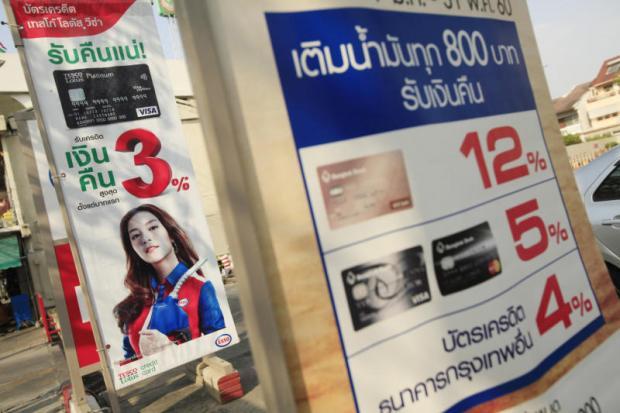Thailand: Oil retailers splash out for market share
Although global oil prices have rebounded more than 60% from the record low of US$30 a barrel during 2014-16 to a range of $50-55, oil demand remains high, encouraging oil retailers to run promotional campaigns to attract motorists.
Thai retail oil demand has seen double-digit growth over the past few years, thanks partly to massive sales campaigns from major oil retailers, including mileage cards and lucky draws.
Some retailers renovated their petrol stations to offer extra services to motorists such as more parking space for the disabled and vendor stalls for locals.
The collapse of global prices started the oil retail war in 2014, as retailers cut the prices of several types of petrol. Retailers allocated huge amounts of capital to renovate their petrol stations and launch non-oil services and goods in the stations.
SET-listed oil retailer Susco Plc, whose traditional clients were large vehicles, buses and trucks, changed gears to focus on personal vehicles, starting the Susco Smart Member campaign using mileage cards. The mileage is verified by the clients’ mobile numbers, eliminating the need to present a card.
“We are targeting a new generation who hold a lot of cards for several purposes, and they can sometimes forget or lose a card. Our phone number verification simplifies the process,” said Susco executive chairman Pimuk Simaroj.
A few months after the scheme was introduced it had 100,000 cardholders. The company wants 1 million cardholders by the end of this year.
Susco announced its revenue goal this year is a new high of 19 billion baht, or 50.6% growth from the previous year, based on its campaign.
Another major oil retailer, mostly state-owned Bangchak Corporation Plc, also expects a big growth year.
In March, Bangchak announced its retail sales volume from retail petrol stations grew 10% each month the first three months year-on-year to 330 million litres. That excludes the petrol sold to state enterprises and other government agencies via wholesale contracts.
President and chief executive Chaiwat Kovavisarach said the rise in sales was largely because of its renovation of petrol stations and expansion to include non-oil businesses at its stations.
“Sales at our new petrol stations reached an average of 1 million litres a month from 500,000 litres,” Mr Chaiwat said.
He declined to give further details about capital expenditure used for promotion and renovation.
Bangchak expects Thailand’s fuel demand this year will grow by 4%. The company claims a 15.6% market share of the retail market, second to the country’s oil and gas conglomerate PTT Plc, which owns a 40.5% share.
SET-listed PTG Energy Plc also announced an aggressive marketing campaign as it aims to be the nation’s largest oil retailer, increasing its stations to 1,800 by 2020 from 1,220 stations now. PTT has around 1,400 stations now.
PTG has therefore set aside up to 5 billion baht of capex for expansion this year.
After PTG recovered from massive debt in 2007, it listed on the SET in 2013. The company wants to be the fourth-largest oil retailer in Thailand within three years.
PTG has maintained its strategy started two years ago, switching from selling to the industrial and fisheries sectors to truck drivers and sedan drivers instead.
The firm also diversified into non-oil businesses using a new marketing strategy. “We could cut off our fat, trying a lean business strategy by improving our logistics system and managing our oil depots efficiently,” said PTG chief executive Pitak Ratchakitprakarn.
PTG’s marketing campaigns include mileage cards and advertisements on many channels.
Auttapol Rerkpiboon, senior executive vice-president for PTT, said the company launched an environmentally friendly design at its petrol stations and increased parking lot space to aid the disabled and women to attract motorists. Around 100 stations have been renovated with this new style so far this year, serving rising demand during the Songkran period, when many Thais drive to their home province. Another 100 stations are scheduled to be renovated by year-end.
PTT also plans to distribute local products from the One Tambon One Product (Otop) scheme at its stations.
“Our promotions will not just promote Otop products. They should display our reputation and show our hospitality,” Mr Auttapol said.
This year PTT has allocated 14 billion baht in capex for its oil business.
Source: http://www.bangkokpost.com/business/news/1238762/oil-retailers-splash-out-for-market-share


 English
English




